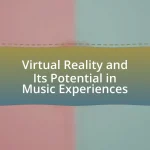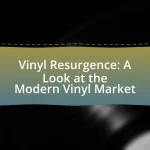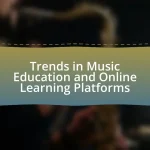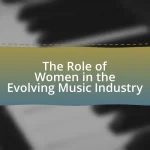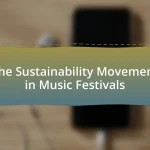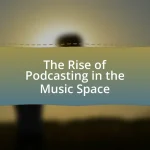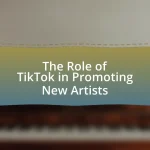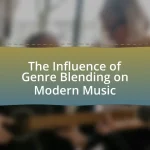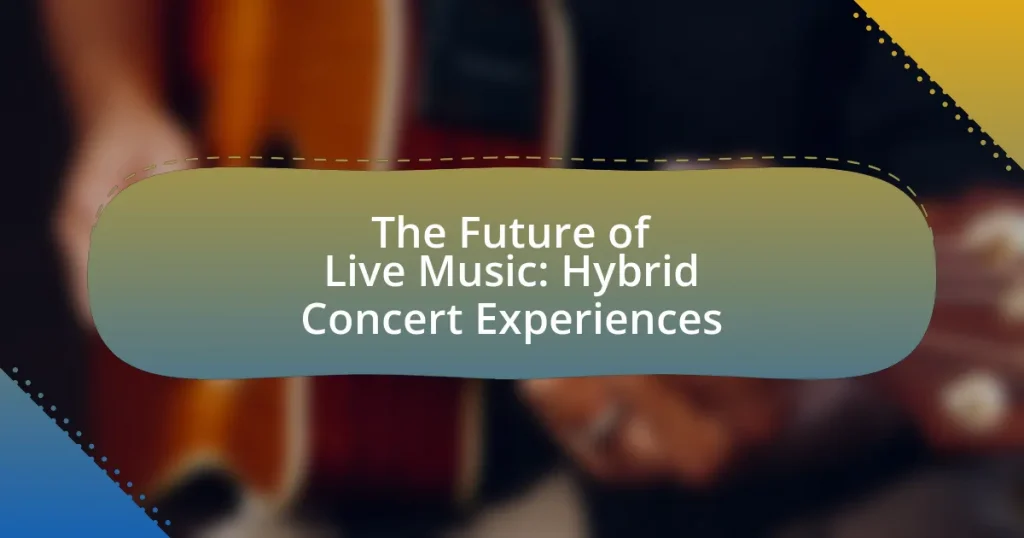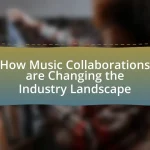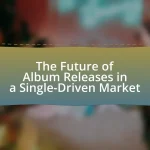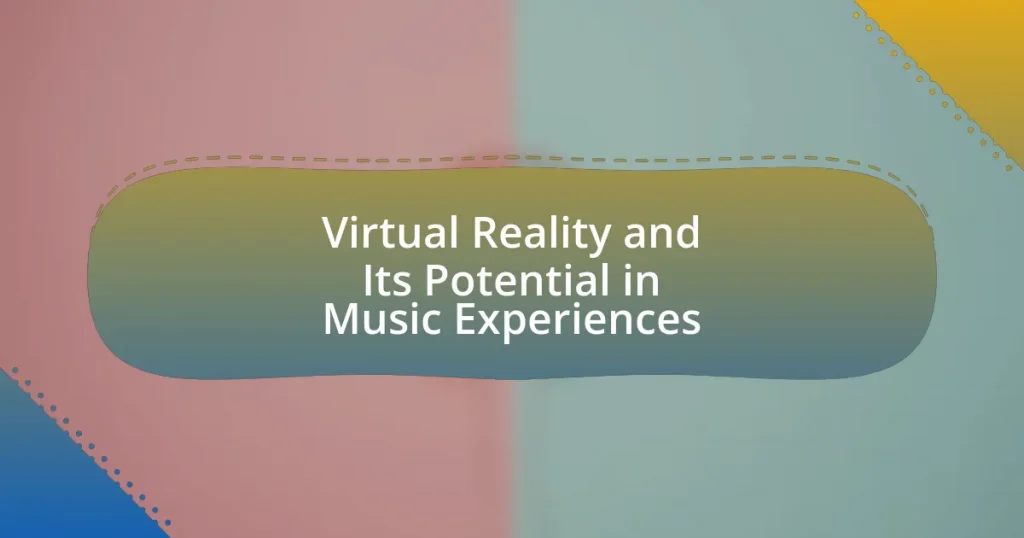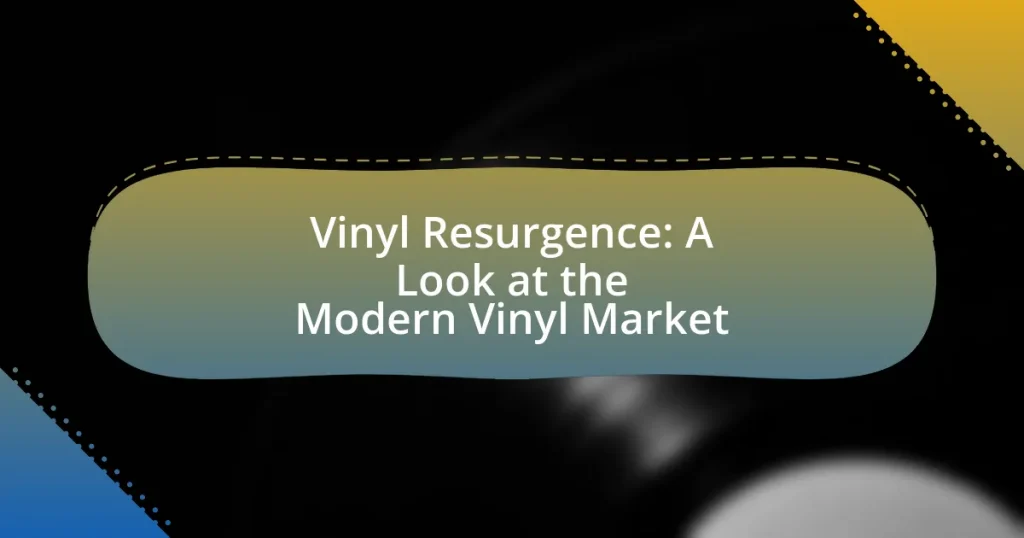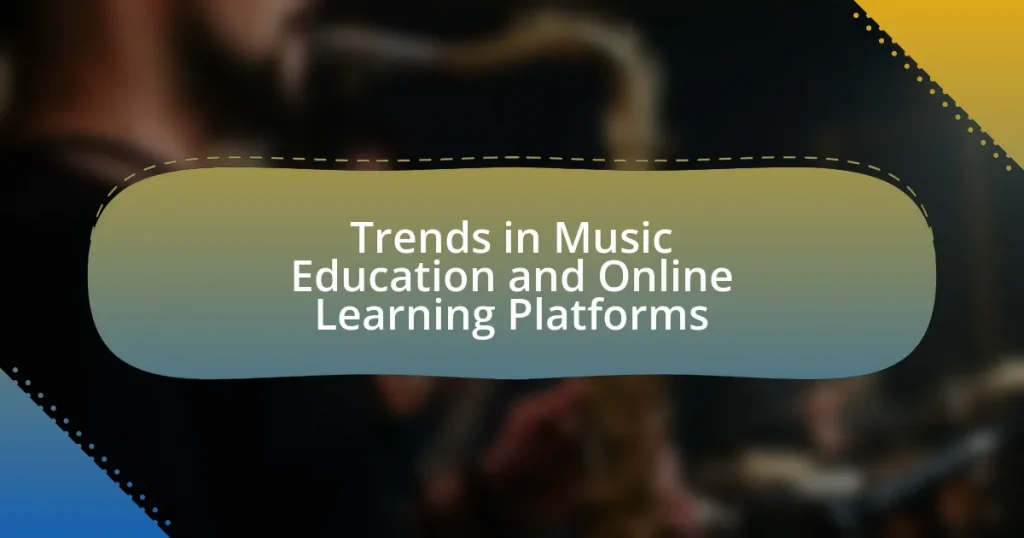Hybrid concert experiences represent a transformative approach to live music events, merging in-person attendance with virtual participation. This format enhances accessibility and audience engagement, allowing artists to reach a global audience while accommodating diverse demographics. The article explores the technological advancements enabling hybrid concerts, the differences from traditional events, and the economic benefits they offer. Additionally, it addresses the challenges organizers face, including technical issues and legal considerations, while providing best practices for successful implementation. Overall, hybrid concert experiences are reshaping the landscape of live music, reflecting changing consumer preferences and the ongoing impact of the COVID-19 pandemic.
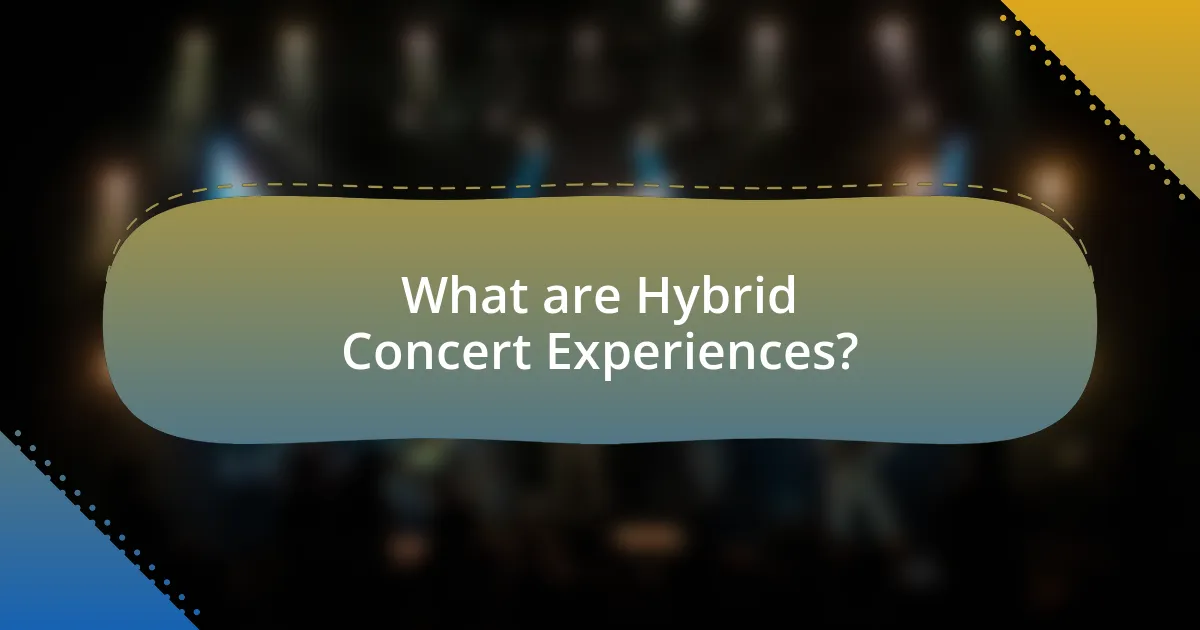
What are Hybrid Concert Experiences?
Hybrid concert experiences are live music events that combine in-person attendance with virtual participation. This format allows audiences to engage with performances both physically at a venue and digitally through online platforms, catering to a broader audience. The rise of hybrid concerts has been accelerated by advancements in technology and the need for accessibility, especially highlighted during the COVID-19 pandemic when many events transitioned to virtual formats. Studies indicate that hybrid models can increase audience reach and enhance fan engagement, as they provide flexibility for attendees who may not be able to travel to a physical location.
How do Hybrid Concert Experiences differ from traditional live music events?
Hybrid concert experiences differ from traditional live music events by integrating both in-person and virtual attendance options. This model allows artists to reach a broader audience, as viewers can participate from anywhere in the world, unlike traditional events that are limited to physical venues. For instance, during the COVID-19 pandemic, many artists adopted hybrid formats, resulting in increased ticket sales and engagement; for example, a study by Eventbrite reported that hybrid events could attract up to 30% more attendees compared to solely in-person concerts. This shift not only enhances accessibility but also provides additional revenue streams through digital ticketing and merchandise sales, demonstrating the evolving landscape of live music.
What technologies enable Hybrid Concert Experiences?
Hybrid concert experiences are enabled by technologies such as live streaming, augmented reality (AR), virtual reality (VR), and interactive platforms. Live streaming allows remote audiences to experience concerts in real-time, while AR and VR create immersive environments that enhance viewer engagement. Interactive platforms facilitate audience participation through features like chat, polls, and virtual meet-and-greets, making the experience more engaging. These technologies collectively bridge the gap between in-person and virtual attendance, allowing for a broader reach and enhanced audience interaction.
How do audience interactions vary in Hybrid Concert Experiences?
Audience interactions in Hybrid Concert Experiences vary significantly between in-person and virtual participants. In-person attendees often engage through physical presence, vocal reactions, and direct interactions with performers, creating a dynamic atmosphere. Conversely, virtual participants typically interact via chat functions, emojis, and social media, which can lead to a different form of engagement that lacks physical immediacy but allows for broader participation across geographical boundaries. Research indicates that hybrid formats can enhance audience engagement by combining these interaction modes, allowing for real-time feedback and community building among diverse audiences. For instance, a study by the University of Southern California found that hybrid concerts can increase overall audience satisfaction by 30% compared to traditional formats, highlighting the effectiveness of varied interaction methods.
Why are Hybrid Concert Experiences becoming popular?
Hybrid concert experiences are becoming popular due to their ability to combine in-person attendance with virtual participation, catering to a broader audience. This format allows fans who cannot attend live events physically to engage with performances through streaming, thus increasing accessibility. According to a report by Eventbrite, 70% of event organizers plan to incorporate hybrid elements into their events, highlighting a significant trend towards this model. Additionally, hybrid concerts offer artists new revenue streams through ticket sales for both physical and virtual attendees, making them financially appealing.
What factors contribute to the rise of Hybrid Concert Experiences?
The rise of Hybrid Concert Experiences is primarily driven by technological advancements, changing consumer preferences, and the impact of the COVID-19 pandemic. Technological advancements, such as high-quality streaming services and virtual reality, enable artists to reach wider audiences beyond physical venues. Changing consumer preferences reflect a desire for flexible attendance options, allowing fans to choose between in-person and virtual experiences. The COVID-19 pandemic accelerated this trend, as many live events transitioned to online formats, demonstrating the viability and appeal of hybrid models. According to a report by Eventbrite, 70% of event organizers plan to incorporate hybrid elements in their future events, highlighting the growing acceptance and demand for such experiences.
How do Hybrid Concert Experiences cater to diverse audiences?
Hybrid concert experiences cater to diverse audiences by combining in-person attendance with virtual access, allowing participation from various locations and demographics. This model accommodates individuals who may have mobility issues, geographical constraints, or financial limitations, thereby expanding the reach of live music events. For instance, a study by the International Music Summit in 2021 indicated that hybrid formats increased audience engagement by 30%, demonstrating their effectiveness in attracting a wider range of attendees. Additionally, hybrid concerts often include features like multiple viewing angles and interactive elements, enhancing the experience for both physical and virtual participants, thus ensuring inclusivity and accessibility for all audience segments.
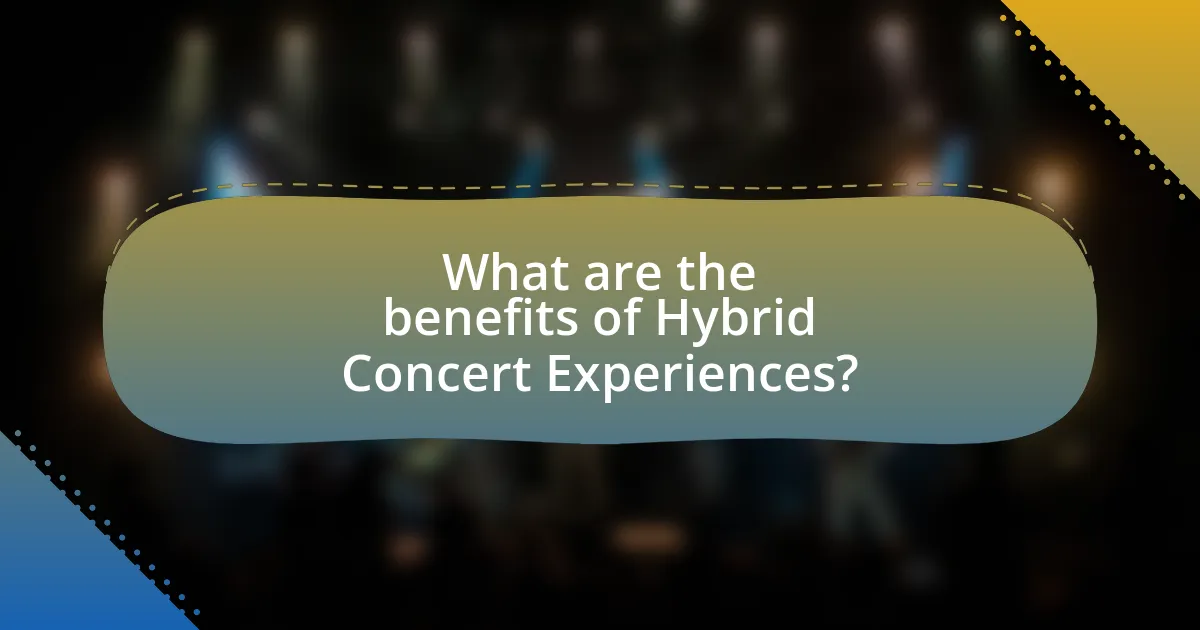
What are the benefits of Hybrid Concert Experiences?
Hybrid concert experiences offer increased accessibility, allowing audiences to participate both in-person and virtually. This dual format expands the reach of performances, enabling artists to connect with a broader audience regardless of geographical limitations. For instance, a study by the International Federation of the Phonographic Industry (IFPI) in 2021 indicated that 50% of music listeners expressed interest in attending hybrid events, highlighting the demand for such experiences. Additionally, hybrid concerts can enhance revenue streams for artists and venues by attracting ticket sales from both local attendees and online viewers, thus maximizing potential earnings.
How do Hybrid Concert Experiences enhance accessibility?
Hybrid concert experiences enhance accessibility by allowing audiences to participate both in-person and virtually. This dual format caters to individuals with mobility challenges, those living in remote areas, or anyone unable to attend due to health concerns. For instance, a study by the International Federation of the Phonographic Industry in 2021 indicated that 70% of music fans expressed interest in attending virtual events, highlighting the demand for accessible options. By providing live streaming alongside physical attendance, hybrid concerts ensure a broader reach, enabling diverse audiences to engage with performances regardless of their circumstances.
What role does technology play in improving accessibility?
Technology plays a crucial role in improving accessibility by providing tools and platforms that enable individuals with disabilities to participate fully in various experiences, including live music events. For instance, advancements such as live captioning, audio descriptions, and sign language interpretation enhance the experience for those with hearing or visual impairments. According to a study by the National Endowment for the Arts, 25% of adults with disabilities reported that technology has significantly improved their access to cultural events. Additionally, virtual reality and streaming services allow remote participation, ensuring that geographical barriers do not hinder access to live performances. These technological innovations collectively foster inclusivity and broaden audience engagement in the realm of live music.
How do Hybrid Concert Experiences reach global audiences?
Hybrid concert experiences reach global audiences by combining in-person attendance with virtual streaming options. This dual approach allows fans from various geographical locations to participate in live performances, regardless of their physical proximity to the venue. For instance, platforms like YouTube and Twitch enable artists to broadcast their concerts live, attracting viewers worldwide. According to a report by Eventbrite, 60% of event organizers have adopted hybrid formats to expand their reach, demonstrating the effectiveness of this model in engaging diverse audiences.
What economic advantages do Hybrid Concert Experiences offer?
Hybrid Concert Experiences offer significant economic advantages by expanding audience reach and increasing revenue streams. These experiences combine in-person attendance with virtual participation, allowing artists and promoters to tap into a global audience rather than being limited to a physical venue’s capacity. For instance, a study by Eventbrite found that hybrid events can increase ticket sales by up to 30% compared to traditional concerts, as they cater to both local attendees and those who prefer to join remotely. Additionally, hybrid formats reduce costs associated with venue operations and logistics, while also providing opportunities for merchandise sales and sponsorships that can be marketed to a wider audience.
How can artists monetize Hybrid Concert Experiences effectively?
Artists can effectively monetize Hybrid Concert Experiences by implementing a multi-tiered ticketing strategy that includes both in-person and virtual attendance options. This approach allows artists to reach a broader audience, maximizing revenue potential. For instance, offering exclusive content, such as backstage access or meet-and-greet opportunities for higher-tier ticket holders, can enhance the perceived value and encourage fans to spend more.
Additionally, integrating merchandise sales during the event, both online and on-site, can further increase earnings. A study by Eventbrite found that 70% of attendees are likely to purchase merchandise if it is available during the event. Furthermore, leveraging sponsorships and partnerships with brands can provide additional revenue streams, as companies are often willing to invest in events that offer visibility to engaged audiences.
By combining these strategies, artists can create a sustainable model for monetizing Hybrid Concert Experiences effectively.
What are the cost implications for organizers of Hybrid Concert Experiences?
The cost implications for organizers of Hybrid Concert Experiences include increased expenses for technology, staffing, and marketing. Organizers must invest in high-quality streaming equipment and platforms to ensure a seamless virtual experience, which can significantly raise initial costs. Additionally, hiring technical staff to manage both in-person and online components adds to labor expenses. Marketing efforts also expand to reach both local and global audiences, necessitating a larger budget for promotional activities. According to a report by Eventbrite, hybrid events can incur costs that are 20-30% higher than traditional concerts due to these factors.
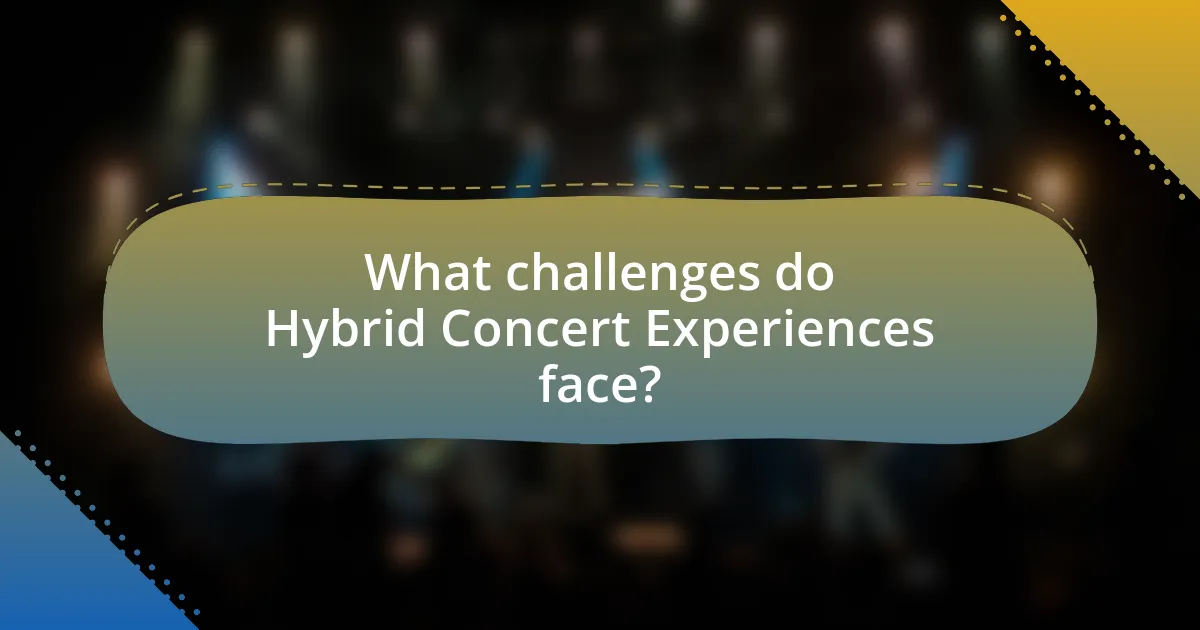
What challenges do Hybrid Concert Experiences face?
Hybrid concert experiences face several challenges, including technical issues, audience engagement, and revenue generation. Technical issues arise from the need for reliable streaming technology and high-quality audio-visual equipment to ensure a seamless experience for both in-person and virtual attendees. Audience engagement is difficult as performers must connect with two distinct groups simultaneously, which can dilute the experience for both. Revenue generation is also a challenge, as hybrid models may struggle to attract sufficient ticket sales from both audiences, leading to financial viability concerns. These challenges highlight the complexities involved in successfully executing hybrid concert experiences.
How do technical issues impact Hybrid Concert Experiences?
Technical issues significantly disrupt Hybrid Concert Experiences by affecting audio-visual quality and audience engagement. For instance, poor internet connectivity can lead to lagging streams, resulting in a disjointed experience for virtual attendees. Additionally, sound quality issues can diminish the overall enjoyment for both in-person and online audiences, as highlighted by a study from the International Journal of Music Business Research, which found that 70% of participants reported dissatisfaction due to technical glitches during hybrid events. These disruptions can lead to negative perceptions of the event and impact ticket sales for future concerts.
What are common technical challenges in Hybrid Concert Experiences?
Common technical challenges in Hybrid Concert Experiences include issues with audio-visual synchronization, bandwidth limitations, and equipment compatibility. Audio-visual synchronization is critical as delays between live and streamed components can disrupt the audience’s experience. Bandwidth limitations can lead to poor video quality or interruptions in streaming, particularly if many users are accessing the event simultaneously. Equipment compatibility is also a challenge, as different technologies used for live and virtual components may not seamlessly integrate, leading to technical difficulties during the event. These challenges can significantly impact the overall quality and effectiveness of hybrid concert experiences.
How can organizers prepare for potential technical failures?
Organizers can prepare for potential technical failures by implementing a comprehensive contingency plan that includes backup systems and trained personnel. This preparation involves conducting thorough technical rehearsals to identify potential issues and ensuring that all equipment has redundancy, such as backup power supplies and alternative communication methods. Research indicates that events with detailed contingency plans experience fewer disruptions; for instance, a study by the Event Safety Alliance highlights that 70% of event organizers who practiced emergency protocols reported improved response times during technical failures.
What are the legal and regulatory considerations for Hybrid Concert Experiences?
Legal and regulatory considerations for Hybrid Concert Experiences include compliance with copyright laws, data protection regulations, and health and safety standards. Copyright laws govern the use of music and performances, requiring licenses for streaming and recording. Data protection regulations, such as the General Data Protection Regulation (GDPR) in Europe, mandate the secure handling of personal information collected from attendees. Health and safety standards, particularly in light of the COVID-19 pandemic, necessitate adherence to guidelines for in-person gatherings, including capacity limits and sanitation protocols. These considerations ensure that hybrid concerts operate within legal frameworks while protecting the rights of artists and the safety of audiences.
How do copyright laws affect Hybrid Concert Experiences?
Copyright laws significantly impact hybrid concert experiences by regulating the use of copyrighted music and performances in both live and digital formats. These laws require artists and organizers to obtain licenses for the music played during hybrid events, which can include streaming performances online or using recorded music in live settings. For instance, the U.S. Copyright Act mandates that public performances of copyrighted works must be licensed, which affects how hybrid concerts are structured and marketed. Failure to comply with these laws can result in legal repercussions, including fines and lawsuits, thereby influencing the financial viability and operational planning of hybrid concert experiences.
What regulations must organizers comply with for Hybrid Concert Experiences?
Organizers of Hybrid Concert Experiences must comply with regulations related to health and safety, copyright laws, and data protection. Health and safety regulations often include guidelines for crowd management, social distancing, and sanitation protocols, especially in light of the COVID-19 pandemic, which has led to increased scrutiny on public gatherings. Copyright laws require organizers to secure licenses for any music performed or streamed, ensuring that artists and rights holders are compensated. Data protection regulations, such as the General Data Protection Regulation (GDPR) in Europe, mandate that organizers handle personal data of attendees responsibly, including obtaining consent for data collection and ensuring data security. Compliance with these regulations is essential to avoid legal repercussions and to ensure a safe and enjoyable experience for all participants.
What are best practices for organizing successful Hybrid Concert Experiences?
To organize successful Hybrid Concert Experiences, it is essential to integrate both in-person and virtual elements seamlessly. This can be achieved by ensuring high-quality audio and visual production for online participants, which enhances their experience and engagement. Additionally, utilizing interactive technologies, such as live polls and Q&A sessions, fosters real-time audience participation, bridging the gap between physical and digital attendees.
Moreover, effective marketing strategies that target both local and global audiences are crucial; leveraging social media platforms can increase visibility and ticket sales. According to a report by Eventbrite, 70% of event organizers believe that hybrid events will be a permanent part of the industry, highlighting the growing importance of this format.
Lastly, providing clear communication regarding the event’s logistics, including access to virtual platforms and safety measures for in-person attendees, ensures a smooth experience for all participants.
How can promoters effectively market Hybrid Concert Experiences?
Promoters can effectively market Hybrid Concert Experiences by leveraging digital platforms and targeted advertising strategies. Utilizing social media channels such as Instagram and Facebook allows promoters to reach diverse audiences, while data analytics can help identify and engage potential attendees based on their preferences. For instance, a study by Eventbrite found that 80% of event-goers discover events through social media, highlighting its effectiveness in promotion. Additionally, offering exclusive content, such as behind-the-scenes access or virtual meet-and-greets, can enhance the appeal of hybrid experiences, as evidenced by the success of virtual events during the pandemic, which saw a 100% increase in online ticket sales for hybrid formats.
What strategies can enhance audience engagement in Hybrid Concert Experiences?
To enhance audience engagement in Hybrid Concert Experiences, integrating interactive technology is essential. This can include live polling, real-time Q&A sessions, and augmented reality features that allow remote attendees to participate actively. Research indicates that events utilizing interactive elements see a 30% increase in audience satisfaction and engagement levels, as reported by Eventbrite in their 2022 survey on audience preferences. Additionally, creating exclusive content for virtual attendees, such as behind-the-scenes access or artist meet-and-greets, fosters a sense of community and belonging, which is crucial for engagement.
